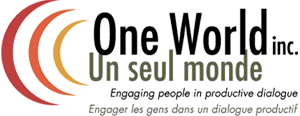Process & Developmental Evaluation
-
https://oneworldinc.ca/wp-content/uploads/2015/10/SlideshowDevEval001.jpg
Developmental evaluation can be especially useful in helping to deal with complex issues where more conventional approaches to evaluation fall short.
-
https://oneworldinc.ca/wp-content/uploads/2015/10/SlideshowDevEval002.jpg
When you hear the word “evaluation,” you might think of it as something that is done after the fact. That would be fair, because that’s when many evaluations take place — after an event, program, or course.
These days, organizations, governments and communities are frequently being challenged to address complex problems. These are problems that don’t lend themselves to easy solutions because they are the result of many interacting factors. Complex issues are also characterized by the fact that the “solution” to an issue does not lie with one single group; it can only be found by working together systematically with various stakeholders who each have their own perspective on the problem – and who each “own” a piece of the solution.
Some examples of complex issues include developing new approaches to address social issues like homelessness, crime prevention or urban intensification; or addressing an environmental issue such as climate change.
The path to developing solutions to complex problems is seldom straightforward; it involves clarifying assumptions about the problem, making decisions about which path to follow, testing solutions on a small scale, and capturing the insights learned along the way so they can be used in the future.
One World uses approaches such as the Theory of Change, and Developmental and Process Evaluations to help groups through the process of engaging with complex issues. These approaches help diverse groups to engage effectively in these issues, to have the conversations that can generate new understandings and approaches, and to support the learning that leads to innovation.
